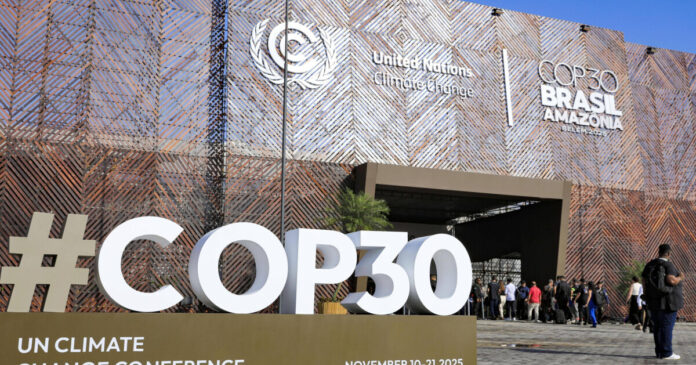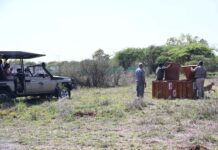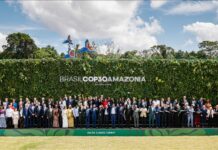Belém, Brazil: Brazilian President Luiz Inácio Lula da Silva declared that bringing COP30 to Belém was “a political and symbolic decision,” underscoring that the Amazon must be seen as part of the climate solution rather than merely a discussion topic.
In his opening address, Lula outlined three key pillars to guide COP30 negotiations: fulfilling existing climate commitments, strengthening global governance, and putting people at the center of climate decisions.
He also proposed the creation of a Global Climate Council, linked to the UN General Assembly, to enhance coordination and accountability among nations.
“We need institutions that are up to the scale of the crisis we are facing,” he stressed. The 30th United Nations Climate Change Conference (COP30) opened on Monday in Belém, in Brazil’s Pará state, marking the first time the world’s foremost climate summit is being held in the heart of the Amazon.
Over the next two weeks, leaders, negotiators, and activists from across the globe will work to transform pledges into practical solutions amid growing urgency to tackle the climate crisis.
“The Amazon is not an abstraction, it is home, it is economy, it is culture, it is life,” Lula said.
“When you leave Belém, the delegates will take with them the commitment to act, while the people of the city will remain with the investments this conference has brought.” he further added.
Framing COP30 as both the “COP of Truth” and the “COP of Implementation,” Lula urged world leaders to move beyond rhetoric and deliver tangible progress on emissions reduction, adaptation, and financing.
“We are moving in the right direction, but at the wrong speed,” he warned, citing recent floods in southern Brazil and Hurricane Melissa in the Caribbean as reminders that climate change is already a “tragedy of the present.”
COP30 President Ambassador André Corrêa do Lago echoed Lula’s saying this conference marks a pivotal shift toward the decade of Paris Agreement implementation.
“This COP must be remembered as the COP of Action — a conference that turns commitments into results,” he said. “It is time to integrate climate, economy, and development, creating jobs, reducing inequalities, and strengthening trust among nations.”
UNFCCC Executive Secretary Simon Stiell described COP30 as a “turning point in the global climate process,” emphasizing that multilateral cooperation must deliver tangible outcomes.
“We are at the mouth of the world’s largest river, and what it teaches us is that great results come from the convergence of many flows,” Stiell said. “Renewables have already surpassed coal as the world’s main energy source. Now it is time to turn ambition into action.”
Mukhtar Babayev, President of COP29, officially handed over the climate leadership to Brazil, calling this new phase “the era of delivery.”
“From now on, there is no room for promises without action. This is the decade of execution, solidarity, and credibility,” Babayev declared, urging countries to focus on fair and tangible results, particularly for developing nations.
Agenda at COP30:- Key focus in Belém is the latest round of Nationally Determined Contributions (NDCs) – national climate plans that spell out how countries intend to cut emissions. To keep warming below 1.5°C, global emissions must fall by 60 per cent by 2030. Current NDCs would deliver only a 10 per cent cut.
Of the 196 Parties to the Paris Agreement, just 64 had submitted updated NDCs by the end of September. At preparatory talks in Germany in June, many countries warned that this ambition gap must be closed at COP30.
Delegates are also expected to approve 100 global indicators to track progress on climate adaptation, making results measurable and comparable across nations.
Today, 172 countries have at least one adaptation policy or plan, though 36 are outdated. The new indicators should help shape more transparent and effective policies.
With the planet heating faster than ever, adaptation is now a central pillar of climate action. But the UN Environment Programme (UNEP) warns adaptation finance must rise twelvefold by 2035 to meet developing countries’ needs.
COP30 will also push forward the Just Transition Work Programme – aimed at ensuring climate measures don’t deepen inequality. Civil society groups are calling for a “Belém Action Mechanism” to coordinate just transition efforts and expand access to technology and finance for the most vulnerable nations
The Conference of the Parties to the UN Framework Convention on Climate Change (UNFCCC), known simply as COP – remains the world’s leading forum for tackling the climate crisis. Decisions are made by consensus, driving cooperation on mitigation, adaptation and finance.
Over the years, COPs have delivered landmark deals. In 2015, the Paris Agreement set the goal of keeping global temperature rise “well below 2°C” while striving for 1.5°C.
At COP28 in Dubai, countries agreed to transition away from fossil fuels “in a just, orderly and equitable manner” and to triple renewable energy capacity by 2030.
Last year in Baku, COP29 raised the annual climate finance target for developing nations from $100 billion to $300 billion, with a roadmap to scale up to $1.3 trillion.
Taken together, the legal framework built over three decades under the UNFCCC has helped avert a projected 4°C temperature rise by the end of this century.






